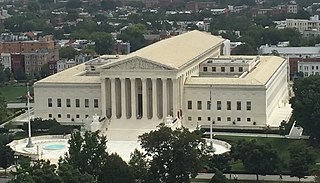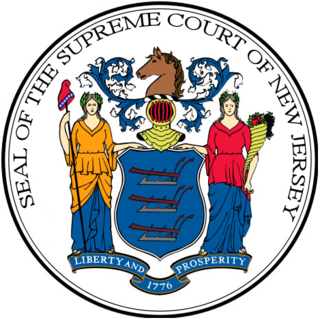
United States appellate procedure involves the rules and regulations for filing appeals in state courts and federal courts. The nature of an appeal can vary greatly depending on the type of case and the rules of the court in the jurisdiction where the case was prosecuted. There are many types of standard of review for appeals, such as de novo and abuse of discretion. However, most appeals begin when a party files a petition for review to a higher court for the purpose of overturning the lower court's decision.

A court of appeals, also called a court of appeal, appellate court, appeal court, court of second instance or second instance court, is any court of law that is empowered to hear an appeal of a trial court or other lower tribunal. In much of the world, court systems are divided into at least three levels: the trial court, which initially hears cases and reviews evidence and testimony to determine the facts of the case; at least one intermediate appellate court; and a supreme court which primarily reviews the decisions of the intermediate courts, often on a discretionary basis. A particular court system's supreme court is its highest appellate court. Appellate courts nationwide can operate under varying rules.
In the United States, a state supreme court is the highest court in the state judiciary of a U.S. state. On matters of state law, the judgment of a state supreme court is considered final and binding in both state and federal courts.
In the United States, a state court has jurisdiction over disputes with some connection to a U.S. state. State courts handle the vast majority of civil and criminal cases in the United States; the United States federal courts are far smaller in terms of both personnel and caseload, and handle different types of cases.
A lawsuit is a proceeding by one or more parties against one or more parties in a civil court of law. The archaic term "suit in law" is found in only a small number of laws still in effect today. The term "lawsuit" is used with respect to a civil action brought by a plaintiff who requests a legal remedy or equitable remedy from a court. The defendant is required to respond to the plaintiff's complaint or else risk default judgment. If the plaintiff is successful, judgment is entered in favor of the defendant. A variety of court orders may be issued in connection with or as part of the judgment to enforce a right, award damages or restitution, or impose a temporary or permanent injunction to prevent an act or compel an act. A declaratory judgment may be issued to prevent future legal disputes.

The Appellate Division of the Supreme Court of the State of New York is the intermediate appellate court in New York State. The state is geographically divided into four judicial departments of the Appellate Division. The full title of each is, for example, the "Fourth Department" is "Supreme Court of the State of New York, Appellate Division, Fourth Judicial Department").

The New Hampshire Supreme Court is the supreme court of the U. S. state of New Hampshire and sole appellate court of the state. The Supreme Court is seated in the state capital, Concord. The Court is composed of a Chief Justice and four Associate Justices appointed by the Governor and Executive Council to serve during "good behavior" until retirement or the age of seventy. The senior member of the Court is able to specially assign lower-court judges, as well as retired justices, to fill vacancies on the Court.

In the history of the courts of England and Wales, the Judicature Acts were a series of Acts of Parliament, beginning in the 1870s, which aimed to fuse the hitherto split system of courts of England and Wales. The first two Acts were the Supreme Court of Judicature Act 1873 and the Supreme Court of Judicature Act 1875, with a further series of amending acts.

The Supreme Court of New Jersey is the highest court in the U.S. state of New Jersey. In its current form, the Supreme Court of New Jersey is the final judicial authority on all cases in the state court system, including cases challenging the validity of state laws under the state constitution. It has the sole authority to prescribe and amend court rules and regulate the practice of law, and it is the arbiter and overseer of the decennial legislative redistricting. One of its former members, William J. Brennan Jr., became an associate justice of the Supreme Court of the United States.

The Constitution of the State of New Jersey is the basic governing document of the State of New Jersey. In addition to three British Royal Charters issued for East Jersey, West Jersey and united New Jersey while they were still colonies, the state has been governed by three constitutions. The first was adopted on July 2, 1776, shortly before New Jersey ratified the United States Declaration of Independence and the second came into effect in 1844. The current document was adopted in 1947 and has been amended several times.
An interlocutory appeal, in the law of civil procedure in the United States, occurs when a ruling by a trial court is appealed while other aspects of the case are still proceeding. Interlocutory appeals are allowed only under specific circumstances, which are laid down by the federal and the separate state courts.
The Superior Court is the state court in the U.S. state of New Jersey, with statewide trial and appellate jurisdiction. The New Jersey Constitution of 1947 establishes the power of the New Jersey courts. Under the State Constitution, "'judicial power shall be vested in a Supreme Court, a Superior Court, County Courts and inferior courts of limited jurisdiction.'" The Superior Court has three divisions: the Appellate Division is essentially an intermediate appellate court while the Law and Chancery Divisions function as trial courts. The State Constitution renders the New Jersey Superior Court, Appellate Division the intermediate appellate court, and "[a]ppeals may be taken to the Appellate Division of the Superior Court from the law and chancery divisions of the Superior Court and in such other causes as may be provided by law." Each division is in turn divided into various parts. "The trial divisions of the Superior Court are the principal trial courts of New Jersey. They are located within the State's various judicial geographic units, called 'vicinages,' R. 1:33-2(a), and are organized into two basic divisions: the Chancery Division and the Law Division".
Prior to 1947, the structure of the judiciary in New Jersey was extremely complex, including Court of Errors and Appeals in the last resort in all causes.

The government of the State of New Jersey is separated into three distinct branches: legislative, executive, and judicial. The powers of the State of New Jersey are vested by the Constitution of New Jersey, enacted in 1947, in a bicameral state legislature, the Governor, and the state courts, headed the New Jersey Supreme Court. The powers and duties of these branches are further defined by acts of the state legislature, including the creation of executive departments and courts inferior to the Supreme Court.
Sylvia Pressler was an American judge who served in a number of positions within the New Jersey judicial system. She is best known for deciding a landmark 1973 case which allowed girls to compete in Little League baseball in New Jersey, and which resulted in the organization changing its charter to allow girls to play in its league nationally. Pressler served as the Chief Judge of the Appellate Division of the New Jersey Superior Court for five years. Prior to this she was the Presiding Judge for 15 years. She officially retired from the bench in 2004. A graduate of Rutgers School of Law–Newark at a time when the legal profession was still dominated by men, Judge Pressler was the second woman to sit on the appellate division in New Jersey, and was one of the first women to clerk for an appellate division judge.
Pro se legal representation comes from Latin pro se, meaning "for oneself" or "on behalf of themselves" which, in modern law, means to argue on one's own behalf in a legal proceeding, as a defendant or plaintiff in civil cases, or a defendant in criminal cases, rather than have representation from counsel or an attorney.

The Judiciary of California or the Judicial Branch of California is defined under the California Constitution as holding the judicial power of the state of California which is vested in the Supreme Court, the Courts of Appeal and the Superior Courts. The judiciary has a hierarchical structure with the California Supreme Court at the top, California Courts of Appeal as the primary appellate courts, and the California Superior Courts as the primary trial courts.
Garden State Equality v. Dow, 82 A. 3d 336 is a New Jersey Superior Court case holding that New Jersey's marriage laws violated the rights of same-sex couples to equal protection of the law under the New Jersey State Constitution. The ruling was issued on September 27, 2013. The Superior Court and the Superior Court, Appellate Division refused the State's request for a stay of the trial court's order, and the New Jersey Supreme Court refused to do so on a 7-0 vote. The ruling took effect on October 21, 2013. On the same day, New Jersey Governor Chris Christie dropped the State's plans to appeal, ending the denial of marriage rights to same-sex couples in New Jersey.

The writ of mandate is a type of extraordinary writ in the U.S. state of California. In California, certain writs are used by the superior courts, courts of appeal and the Supreme Court to command lower bodies, including both courts and administrative agencies, to do or not to do certain things. A writ of mandate may be granted by a court as an order to an inferior tribunal, corporation, board or person, both public and private. Unlike the federal court system, where interlocutory appeals may be taken on a permissive basis and mandamus are usually used to contest recusal decisions, the writ of mandate in California is not restricted to purely ministerial tasks, but can be used to correct any legal error by the trial court. Nonetheless, ordinary writ relief in the Court of Appeal is rarely granted.
Kimmelman v. Morrison, 477 U.S. 365 (1986), was a decision of the U.S. Supreme Court that clarified the relationship of the right to effective assistance of counsel under the Sixth Amendment to other constitutional rights in criminal procedure. In this case, evidence against the defendant was probably seized illegally, violating the Fourth Amendment, but he lost the chance to argue that point due to his lawyer's ineffectiveness. The prosecution argued that the defendant's attempt to make a Sixth Amendment argument via a habeas corpus petition was really a way to sneak his Fourth Amendment argument in through the back door. The Court unanimously disagreed, and held that the Fourth Amendment issue and the Sixth Amendment issue represented different constitutional values, and had different requirements for prevailing in court, and therefore were to be treated separately by rules of procedure. Therefore, the habeas corpus petition could go forward. In its opinion, the Court also gave guidance on how to apply its decisions in Stone v. Powell and Strickland v. Washington.










